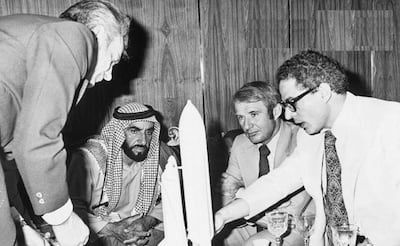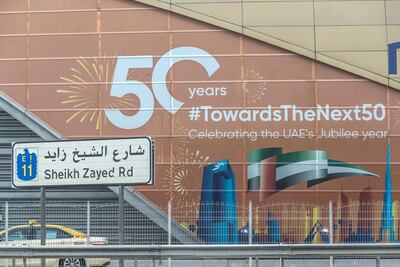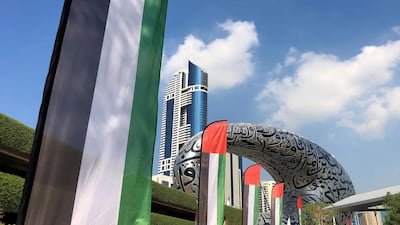As we enter the year-long celebrations of the 50th anniversary of the formation of the UAE in December 1971, I have been pondering over my memories of those years, from 1975 onwards and my thoughts on the future.
One of the most remarkable features of the Emirates is how it has not just survived, but thrived. There have been ups and downs, of course. No country can escape those, especially one which, like the UAE, is so intimately bound to the global economic cycle because of its important oil and gas industry. So we have seen slumps, as well as booms. But for the most part, the country has steered a consistent path, even as its population has grown from around 250,000 at the time the federation was created to more than nine million today.
While the economy is now recovering from the Covid-19 pandemic, those of us who remember previous setbacks, such as the collapse of oil prices in the 1980s, have confidence in the UAE's ability to move forward once more.

The extraordinary extent of the acceptance of mutual coexistence amongst the UAE’s multinational population is also, in my view, something well worth remembering. This country has always welcomed people of other cultures and other faiths, of course, as anyone with a knowledge of local history can explain. This is not, though, a static process. During my years here, I have seen people arrive, become a part of the fabric of life in the Emirates and play their part in the development of community and country.
All that has taken place against a background of rapid and peaceful social and economic change that has meant that the UAE today, in terms of its urban centres, at least, is almost unrecognisable when compared to 1971. The amazement of former residents who return after a decade or two away is almost palpable.
The contrast with many of the other countries within the broader Middle East region is sufficiently sharp as to need no description.
Looking back, I give thanks that, at its birth, the UAE was endowed not just with financial resources, but with political leadership – not least that of the late Sheikh Zayed, the Founding Father – that had the wisdom to chart the course that we have followed.
What, though, can that tell us about the half-century that lies ahead?
The pace of technological progress is such that it is, I think, nearly impossible to imagine how society will look 50 years from now. How will the increasing adoption of artificial intelligence change lives, both at work and elsewhere? If advances in health care mean that the lives of most become longer, how will we adapt not just to that, but to the presumably inevitable population growth that will follow? How will the nature of travel and other communications change? What will be the key aspects of our economy, and of the economies of our present and future partners? How will our governmental system evolve to ensure the continuation of an effective two-way process of dialogue and interchange between the state and the people? How will we tackle the environmental challenges posed by climate change and the need to devise sustainable ways of exploiting natural resources before it is too late? How can we preserve the key elements of our heritage?

For these, and for many other questions, I have no answers – merely further questions.
If, however, we look back half a century, either by recalling our own memories or by learning from those of others, a not dissimilar set of questions emerges.
Over the past 50 years, the UAE has dealt with those through a process that has involved not just careful planning but also a willingness to recognise that all plans may be liable to change as circumstances change. The ability to innovate and to adapt in pursuit of long-term goals has been fundamental both to the successes that the UAE has achieved and to the overcoming or circumventing of unexpected challenges. That ability is still evident today, as is the ability to dream.
There can be no guarantees that we will reach the targets that we now set ourselves, or, indeed, that those targets will still exist.
The same was true, of course, of the targets set back in 1971. Some have fallen by the wayside as priorities change. Others have been overtaken by changing events. What has remained, however, has been a sense of optimism, a belief that the underlying goal of creating a better society not only remains relevant but is achievable, even if the routes towards it may evolve.
Looking back, that optimism has been evident throughout our history. That is something truly worth celebrating in our anniversary year and a noble goal to set our sights on in the years ahead.
Peter Hellyer is a consultant specialising in the UAE’s history and culture


